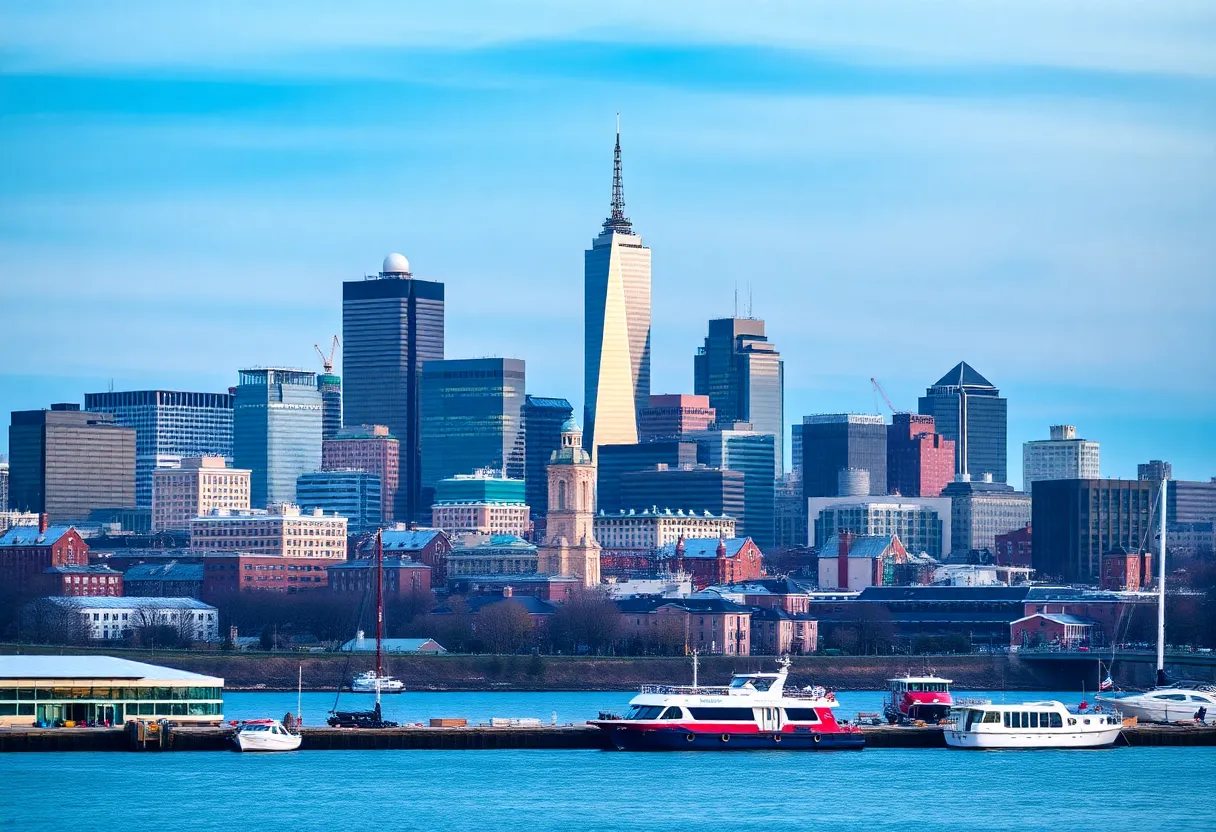Boston, October 9, 2025
News Summary
Boston, the leading center of life sciences globally, is at risk as federal funding cuts and global competition increase. Proposed changes under the Trump administration threaten essential grants and immigration for talent, leading to concerns about Boston’s future in biotech. States like Massachusetts are attempting to counter such changes with financial support, while emerging competitors both nationally and internationally, including Shenzhen and Cambridge, UK, may gain market share. Experts stress the necessity for adaptation to maintain Boston’s historical dominance.
Boston
Federal funding cuts and rising global competition put Boston’s biotech lead at risk
Boston has been the leading center of the world’s life sciences industry for over a decade, with more lab space than anywhere else globally. The region attracts billions in venture capital and federal funding for research, nearly doubling biopharma employment in the past decade. Those strengths are now under pressure as proposed federal changes and faster growth in other regions raise questions about Boston’s ability to maintain its dominant position.
Immediate risks and financial context
Federal budget shifts under the Trump administration’s proposed policies—specifically moves that would reduce federal grants and restrict visas for international students and workers—threaten Boston’s biotech success. Boston has attracted over $45 billion in National Institutes of Health funding over the last 25 years and committed an additional $2.6 billion from state initiatives to bolster life sciences. Recent federal funding cutbacks have prompted Massachusetts Governor Maura Healey to propose a $400 million support package for nonprofit research institutions.
If foreign governments enhance their investments while the U.S. pulls back, regions in Europe and Asia might gain a larger share of the biotech business. Economic historical patterns suggest a risk of established hubs losing their edge if unfavorable conditions persist, as shown by Germany’s historical decline when scientists fled in the 1930s.
Competition at home and abroad
A JLL report confirms Boston-Cambridge’s dominance as the top life sciences cluster in the U.S., with San Francisco and San Diego following. San Francisco ranks higher than Boston for its startup ecosystem, medical technology innovation, and integration of artificial intelligence. North Carolina’s Research Triangle and New Jersey also outperform Boston in areas like biomanufacturing. Houston is emerging as a possible competitor with its own nexus of research universities and hospitals, spurred by investment from Eli Lilly & Co. for a new manufacturing facility.
Internationally, Boston faces increasing competition from regions such as Shenzhen, China, which is becoming a significant player in life science licensing transactions and is gaining market share from the U.S. The UK’s Cambridge is emerging as a European life sciences capital, with significant venture capital growth and a strong association with the University of Cambridge. The amount of venture capital flowing into Cambridge, UK, has increased tenfold in the past decade, reaching $2.3 billion. Numerous “unicorn” startups linked to the University of Cambridge are emerging, showcasing the city’s innovation potential. Cambridge, UK, is now per capita the second-most intensive innovation cluster globally, according to the United Nations’ Global Innovation Index.
How other cities are responding
Other cities, however, are attempting to harness their own research institutions to create innovation and drive life science startups. Toronto has even organized a symposium titled “Can Toronto be the Next Boston?” featuring Travis McCready, who advised cities to carve their paths rather than trying to be Boston. Experts believe it’s unlikely another city could fully replicate Boston’s unique scientific ecosystem, which includes connections between Harvard, MIT, and world-class hospitals like Massachusetts General and Dana-Farber Cancer Institute.
Outlook and strategic considerations
Experts like Harvard economist Amitabh Chandra warn that if the U.S. scientists and research community face too much instability, the industry overall could contract. Boston is encouraged to be adaptable without relying on past successes to maintain its position in the biotech field. Notable voices in the industry suggest that the focus on artificial intelligence and scientific discovery may herald a new revolution in biotech.
Biotech hubs in the U.S. may attract more talent as federal support declines, with cities offering lower tax rates and living costs gaining attractiveness. The positive clinical results from studies, such as those by companies like Nanobiotix, highlight ongoing innovation within the sector, with developments expected to have a profound impact on cancer treatment.
What this means now
The most immediate impacts will be on early-stage research funding, lab space demand, and hiring of international researchers and technicians. Policymakers and local leaders in Boston are already pursuing state-level support to offset federal changes. At the same time, regional competitors that combine research institutions, targeted investment, and lower operating costs are positioned to capture some growth the Boston region has historically enjoyed.
FAQ
Q: What is Boston’s standing in the life sciences industry?
A: Boston has been the leading center of the world’s life sciences industry for over a decade, with more lab space than anywhere else globally.
Q: How has Boston funded its life sciences ecosystem?
A: Boston has attracted over $45 billion in National Institutes of Health funding over the last 25 years and committed an additional $2.6 billion from state initiatives to bolster life sciences.
Q: Are federal changes affecting Boston’s biotech sector?
A: The Trump administration’s potential changes, such as reducing federal grants and restricting visas for international students and workers, threaten Boston’s biotech success.
Q: What local government actions have responded to funding cuts?
A: Recent federal funding cutbacks have prompted Massachusetts Governor Maura Healey to propose a $400 million support package for nonprofit research institutions.
Q: Which U.S. regions are notable competitors to Boston?
A: A JLL report confirms Boston-Cambridge’s dominance as the top life sciences cluster in the U.S., with San Francisco and San Diego following.
Q: How is international competition developing?
A: Boston faces increasing competition from international regions, especially Shenzhen, China, which is becoming a significant player in life science licensing transactions and is gaining market share from the U.S.
Q: Is Cambridge, UK, becoming a life sciences hub?
A: The UK’s Cambridge is emerging as a European life sciences capital, with significant venture capital growth and a strong association with the University of Cambridge.
Q: How much venture capital has flowed into Cambridge, UK?
A: The amount of venture capital flowing into Cambridge, UK, has increased tenfold in the past decade, reaching $2.3 billion.
Quick reference table
| Topic | Key fact | Potential implication |
|---|---|---|
| Boston lab capacity | Boston has been the leading center of the world’s life sciences industry for over a decade, with more lab space than anywhere else globally. | High existing density supports startups and research but depends on sustained funding and talent flows. |
| Federal and state funding | Boston has attracted over $45 billion in National Institutes of Health funding over the last 25 years and committed an additional $2.6 billion from state initiatives to bolster life sciences. | Significant past investment provides a cushion; proposed federal cuts could reduce momentum. |
| State response | Recent federal funding cutbacks have prompted Massachusetts Governor Maura Healey to propose a $400 million support package for nonprofit research institutions. | State-level intervention aims to stabilize local research organizations. |
| International competitors | Boston faces increasing competition from international regions, especially Shenzhen, China, which is becoming a significant player in life science licensing transactions and is gaining market share from the U.S. | Global investment shifts could redirect talent and deals away from Boston. |
| UK growth | The amount of venture capital flowing into Cambridge, UK, has increased tenfold in the past decade, reaching $2.3 billion. | Growing European cluster that could attract startups and investors. |
Deeper Dive: News & Info About This Topic
HERE Resources
National Coffee Day Promotions in Boston
Compass Moves to Acquire Anywhere, Shaping Rhode Island’s Real Estate Market
Carna Health Launches CKD Screening Programs in Bermuda and Cameroon
Boston’s Office Market Faces 25-Year High Vacancy Rate
Cultural Programming in Cambridge and Somerville This Week
Impact of Federal Policies on Massachusetts Economy
Massachusetts Cities Rank Among Best Places to Live
Boston Biotech Layoffs: How To Navigate Severance, Benefits, And Job Search
Boston Job Market Outlook 2025: Hiring Trends For Tech And Healthcare
Massachusetts Layoffs 2025: Guide For Affected Workers And Job Seekers
Additional Resources
- Stat News: Boston and Cambridge Biotech Capital
- Wikipedia: Boston
- Boston Globe: Business Section
- Google Search: Berkshire biotechnology
- Fierce Biotech: New Firm Launch
- Encyclopedia Britannica: Biotechnology
- Financial Content: Nanobiotix Success
- Google News: Biotechnology Innovation
- BioPharma Dive: PureTech Biotech Incubator
- Google Search: Biotech Startups

Author: STAFF HERE BOSTON WRITER
The BOSTON STAFF WRITER represents the experienced team at HEREBoston.com, your go-to source for actionable local news and information in Boston, Suffolk County, and beyond. Specializing in "news you can use," we cover essential topics like product reviews for personal and business needs, local business directories, politics, real estate trends, neighborhood insights, and state news affecting the area—with deep expertise drawn from years of dedicated reporting and strong community input, including local press releases and business updates. We deliver top reporting on high-value events such as Boston Marathon, Head of the Charles Regatta, and Boston Harborfest. Our coverage extends to key organizations like the Greater Boston Chamber of Commerce and Associated Industries of Massachusetts, plus leading businesses in finance, biotech, and insurance that power the local economy such as Fidelity Investments, Biogen, and Liberty Mutual Insurance. As part of the broader HERE network, we provide comprehensive, credible insights into Massachusetts's dynamic landscape.





